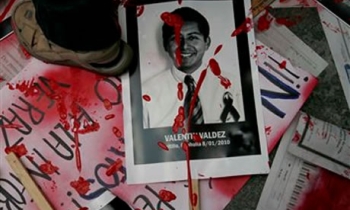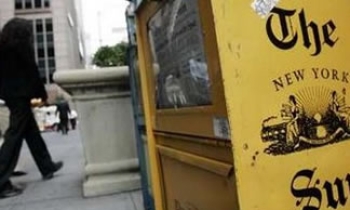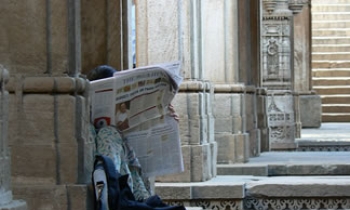Jim McClatchy bore many titles during his six-decade career: pilot, Army officer, business manager, publisher, philanthropist, chairman of the board. But in a conversation not long before his death, he made a succinct request as to how he wanted to be remembered:
"Put down that I was a newspaperman."
He was that.
James Briggs McClatchy, senior member of one of California's pioneering newspaper families, died early Friday at his home in Carmichael. His wife, Susan, was with him. He was 85.
The death of the former publisher and board chairman of The McClatchy Co. came as a shock to his family and friends. Last week, he attended a corporate meeting and last Saturday he was at California State University, Fresno, to receive an honorary doctorate.
But complications from outpatient surgery for lung disease ended a long life that was productive right up until his final days.
"Jim was born into what could have been a life of wealth and privilege, but he chose to live life as a fighter," said Gary Pruitt, chairman and chief executive officer of The McClatchy Co., headquartered in Sacramento and owner of The Bee.
"He fought to further the company's founding values of integrity and public service. And he always fought for the ordinary citizen, for the common man."
McClatchy carried that passion beyond the newsroom and the boardroom. Locally, he was an advocate for smart growth and regional planning, helping to found the nonprofit Valley Vision organization to further those ends.
Globally, as head of the Inter-American Press Association, he spearheaded the Declaration of Chapultepec, a free-speech proclamation signed by 19 heads of state in this hemisphere and 2,000 other politicians, writers, journalists and intellectuals.
Personally, the native Sacramentan was honest, funny and athletic, said his longtime friend Burnett Miller, who served as Sacramento mayor in the early 1980s. As young bachelors in the 1940s, the two shared an upstairs apartment in an old Victorian across from the Capitol.
"He was working for The Sacramento Bee as a reporter then," Miller said. "We chased girls, traveled together, went sailing in the San Francisco Bay. We had great adventures."
The two remained friends as they raised their families and grew older. The one thing that never changed, Miller said, was McClatchy's commitment to journalism.
McClatchy was a member of the fourth generation of one of the state's oldest newspaper families. His great-grandfather and namesake was a founding editor of The Sacramento Bee in 1857. His grandfather, C.K., owned and edited the paper for more than half a century.
His father, Carlos, was the founder and first editor of the Fresno Bee. His aunt, Eleanor, ran McClatchy Newspapers for more than 50 years. And his brother C.K. was editor and president of the company in the 1970s and 1980s.
By most accounts, he was not interested in the trappings of wealth and influence normally associated with a powerful publishing family. His usual attire was a faded Oxford shirt and a worn sweater or sport coat; he drove a well-used VW Passat.
For years, the frugal McClatchy drove a stick-shift car with no air conditioning, recalled San Francisco attorney William Coblentz, a family friend and McClatchy Co. board member.
"That car!" Coblentz said with a chuckle. "I told him I wouldn't ride with him. No limousines for Jim. He wasn't flooded with his own conceit -- he didn't take himself that seriously. And he never deviated from integrity, honesty, thoroughness. He was an uncommon man."
If it sometimes made McClatchy uncomfortable being part of a highly visible family, he was fiercely proud that it was a family that viewed its enterprises as more of a cause than a company. And he was fiercely resistant to the idea that a newspaper was just another "product."
"Do our newspapers have something other newspapers don't have?" he asked a group of McClatchy editors in 1993.
"Are we really different? The answer is yes, our newspapers have philosophical roots … a caring about the way things are for the ordinary person, caring about the way the world is, the way the state is, the way the city is. … That concern was personal and expressed by editors 100 years ago, and 50 years ago, and it should be expressed by editors 50 years from now."
McClatchy was born in Sacramento on Dec. 17, 1920, the oldest of three sons. His father, Carlos, the only son of C.K. McClatchy, had moved to Fresno to launch a newspaper there. His mother, Phebe Briggs McClatchy, was the daughter of a pioneering Central Valley family.
In later years, Jim McClatchy said some of his earliest memories were of accompanying his father to "what seemed like a hurricane of activity" at the Fresno Bee.
"I remember once one of the pressmen let me push the button to start the press," he said, "and my father told him, 'Give him something to do that will get him dirty. I want him to learn the business from the bottom.' "
Carlos McClatchy died when Jim was 12.
Jim earned his first Bee byline in 1936 while on a vacation tour of Europe. It appeared on a story in which he suggested the English traffic system was superior to the U.S. system, even though he was too young to drive.
After finishing high school in Fresno, McClatchy enrolled at Stanford University. When the United States entered World War II, he left school and enlisted in the Army Air Corps.
McClatchy earned his wings and became an aerodynamics instructor. After the war, he finished his undergraduate degree at Stanford, then earned a master's degree in journalism from Columbia University.
In 1947, he joined the staff of The Sacramento Bee as a general assignment and education reporter. In October 1949, young McClatchy covered U.S. military maneuvers in the Pacific, then wrote a series of stories on Hawaii's bid to become a state.
Two months later, he wrote a poignant series on the plight of migrant farmworkers in the Central Valley. The images never left him, and he would later establish the Central Valley Foundation, a group that provided educational support to Central Valley immigrant children.
McClatchy, who remained in the Army reserves after World War II, was recalled to active duty in early 1951 when the Korean War started.
In late 1952, he went back to Fresno, where he became a City Hall reporter for the Fresno Bee. Over the next eight years, he served as the state capital correspondent for Fresno and Modesto; as a political correspondent covering the 1956 presidential campaign; and as a member of the company's Washington, D.C., bureau.
While working in Washington in 1958, McClatchy married Jean Fugitt, a researcher. The couple, who would divorce in 1973, had two sons, William and Carlos.
As strong-willed and blunt as his father and grandfather, Jim McClatchy did not always see eye-to-eye with his Aunt Eleanor, head of the company, on the way the family papers were run.
He left the company in 1964 to start or buy several small papers in San Francisco; Marin County; Sparks, Nev.; and Lake Tahoe. In 1972, he was elected president of the Lake Tahoe Area Council.
In 1980, the year he married his second wife, Susan, and the year Eleanor died, Jim McClatchy was named the chairman of the board of McClatchy Newspapers.
In 1987, his brother C.K. assumed the chairmanship and Jim was named publisher of McClatchy Newspapers, responsible for general corporate planning and acquisitions. When C.K. died in 1989, Jim McClatchy returned to the board chairmanship. In 1995, he was renamed publisher. In 2004, he retired as a board member.
Today, fifth-generation McClatchys have moved into leadership roles in the company. Four of them -- including Jim's son William -- are on the 14-member board of directors.
"The next generation has found inspiration in his passion for newspapers, for improvements in community and protection of freedom of the press," William McClatchy said of his father on Friday.
Jim McClatchy endorsed the company's recent purchase of Knight Ridder Inc. -- making The McClatchy Co. the second-biggest newspaper chain in the nation -- as long as McClatchy's historic values were upheld.
To the end, Jim McClatchy was a newspaperman.
"I say it is not enough for us to have integrity and independence," he said in the 1993 speech to company editors. "… Every newspaper is supposed to have integrity and independence.
"… If I believe in anything, I believe we must keep the faith with the many people who gave these papers not only integrity and independence, but extra elements of character and personality and convictions."









